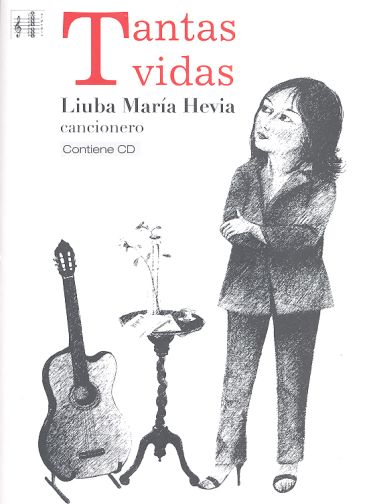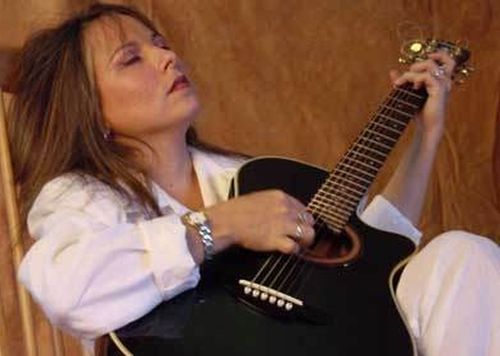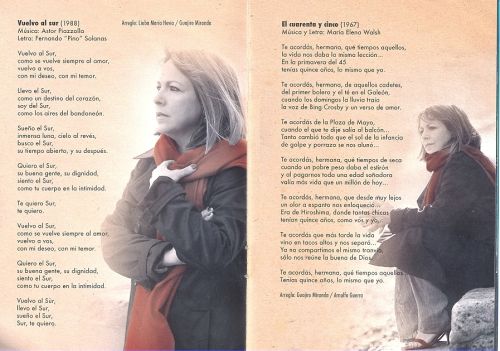Liuba María Hevia remembers the moments in which she first came to Sancti Spiritus when she was 19 years old, and how her life has been linked to this territory ever since.
I’ve lived so many lives I cannot explain,/ how much space is transformed when I look back,/ I’ve shared with death more than one sign,/ I’m not afraid of her implacable universal arrow./ These words were written by Liuba María Hevia, maybe in an attempt to put into verses a life marked by melodies, applauses, loses, loneliness, happiness. A life lived carrying her guitar on her shoulder, always singing.
She once confessed to be frightened when the girl inside her opened her wings to fly. But now it is the woman who talks, a woman who loves watching the sea.
She also remembers how she first came to Sancti Spiritus when she was 19 years old, as member of the Revolutionary Armed Forces (FAR) artistic group. Part of her life has been linked to this territory ever since.
“I was in constant interaction with this province because I used to visit Tierra Fría, in Encrucijada, province of Villa Clara, where my father’s family lives. That’s not far from Sancti Spiritus. But the affective bond became more special when I first arrived in Jarahueca. I also visited Iguará, the main city of the region, and other places, as well. I don’t remember the exact date, but I can say that from that moment on, Sancti Spiritus turned into a gift for my profession”.
How come that someone from Havana connects with these regions?
It might be because I met people from the countryside, who are usually kinder, nobler, and hardworking. I was born in Havana, but my soul is that of a countryside person. In my house, these people were very much respected, and we liked their music very much. Ada’s (Elba Pérez) relatives are also from the countryside like my mother, who’s a native of Bolondrón, Matanzas.
It might also be because of the famous Sancti Spiritus’s countryside music, which I love. When I visited the Canary Islands —a paternal great-grandmother used to live there— I noticed that a great deal of their culture is found here. All these things made me reverence this site so that after so many years I must confess that Sancti Spiritus’s got part of my soul.
NOSTALGIAS
Upon arrival in Jarahueca, Liuba’s muses were let loose. For four years, melodies and compositions were written amidst bucolic scenes.
“It was a luminous youth, full of creation, which surprised Ada and me with thousand coincidences. The visits were short, but intense. We went to a school where a cousin of hers worked, and we sang there, in the house or in a very modest location which currently hosts the biennial event to her memory, because who could have said that Ada would die at the age of 30, in an absurd accident.
“We took the cassettes recorded in Radio Progreso and what was supposed to be a family visit became an encounter with stanza singers and poets. (…) It’s the spirit what matters, it’s all you can take with you, I learned that from my mother”.
After Ada died you have come to Jarahueca again. How can you deal with your memories?
Thanks to Yaguajay I had a family for ever, a dwarf that got inside my house and brought the best of poetry. Jarahueca has a different connotation since Ada’s departure. She was the girl who wrote verses, played the guitar by ear, walked almost one kilometre looking for a record player to listen to an album of Serrat that was some gave to her as a gift. She was also the sculptor, the Plastic Arts graduate; a woman of solid sensibility.
There are persons touched by a very particular grace, their stay on earth is fleeting, but they leave so much light behind, even after they are gone, that you begin to re-discover them, and find new nuances in them. Ada was one of those persons. This is what happens in every biennial event: the people reunite, the houses are painted…It’s to come back to enjoy the shadow of the invisible tree left to us by Ada, which is Jarahueca itself. The pain transforms things, makes many fields grow. That place grew out of pain, out of respect for Ada.
SO MANY LIVES
Sitting at the table, Liuba goes over chapters of her life while browsing a book. After a four year compilation of press news, messages, letters, memories…she caresses the cover of Tantas vidas (So many lives), sort of travel chronicles under the name of songbook “where I share secrets with people that maybe will never meet me, poems written by Ada and read by Verónica Lynn, the chords of some songs which have been important in my life and tell who I am, together with a series of photographs in which I show a not very well known aspect of me: my delirium for disguise to become as many characters as I can”.
Not afraid of undressing your soul that much?
No way. Whenever I do something, I think it might be the last I do, because life is uncertain, and I have proof of that. I think it’s fair to make this sort of confession so as to allow people get into moments of my life.
The book is titled Tantas vidas. If you could have the chance to write your own history, which episodes could not be missing?
My childhood and the day I had my first guitar thanks to a collection made by my maternal family. I was given the guitar when I was 13, it was bought in Bejucal. I used to play one I borrowed from a friend, and I also had a toy guitar. It was a wonderful moment because my relatives discovered that that girl who had difficulties concentrating at school, and an academic performance lower that her sister’s, needed to express herself through the guitar’s strings.
I would also include the fact of having accompanied my mother until the end, being mature enough to be by her side knowing that she would leave for ever. How I now feel stronger to face death, and the way I confirm the value of life. Having known Ada, the friends I have outside Cuba, and singing for the children in hospitals.
WHEN THE GUITAR IS RESTING
(…)
When the curtains come down, we can see this tiny woman who turned 50 this December, the one who owns a dog named Tango Hevia, and who is unable to prefer a colour above others “because if I do so, I would be betraying the rest of the colours. I love dancing, although I may not do it well. Joaquín Sabina says that dancing is dreaming with the feet, and I believe that. No one can imagine how much I adore popular music, Latin American music, —Brazilian music drives me crazy—, and also jazz. I can eat anything, and I’m the worst cooker in the world. My mother always said that my kitchen was like a hardware store, because everything was clean, or was made out of plastic or glass. She also said I was a demon for rest”.
And she talks about how Isabell Allende and Saramago’s narrative succumbs. She confessed to be in love with Marti, “whom Cubans will never get to know completely because he will always have mysteries to unveil”.
Nevertheless, it’s hard to believe that someone with such a sensible universe doesn’t have any ritual. “I don’t even have a defined religious belief —she admits—. I believe in people, love, in feeling useful, which is the greatest that a human being can experience in any profession. For example, when I work for a child in the oncological hospital. Maybe those are my rituals”.
Fears…
Not to live what life deserves, not to have the opportunity to say what I need to say, not to have friends who criticize me for having done something wrong, and not to meet with the people I love somehow.
The answer to this question is always focused from the subjective point of view. But, what frightens Liuba María Hevia?
I’m terrified of cockroaches. I can bring a wardrobe down if I see of those. I live in my world, with my guitar, my muses…and with cockroach poison all the time.
 Your music has never followed the tenets of fashion, yet it has always succeeded. Why do you think is that so?
Your music has never followed the tenets of fashion, yet it has always succeeded. Why do you think is that so?
Art is a mystery, like love. I think it’s been so because I’ve had my soul involved in part of the essence of many people, more than I imagined. For example, singing habaneras, countryside music…this still has the mystery to connect or create something that moves.
Why someone so captivated by children didn’t venture to be a mother?
This is the first time I’m asked about it. I’ve said that I will leave this world without unfulfilled dreams, but now that I think about it, this could be one. I have to admit that I could have had a child, but due to certain circumstances, it was not possible, and then my life changed.
Despite that, and despite having lost important persons in your life, are you happy?
Very happy, and I’ve felt that way for many years now, even when I’ve missed someone.
 Escambray ENGLISH EDITION
Escambray ENGLISH EDITION







Escambray reserves the right to publish comments.